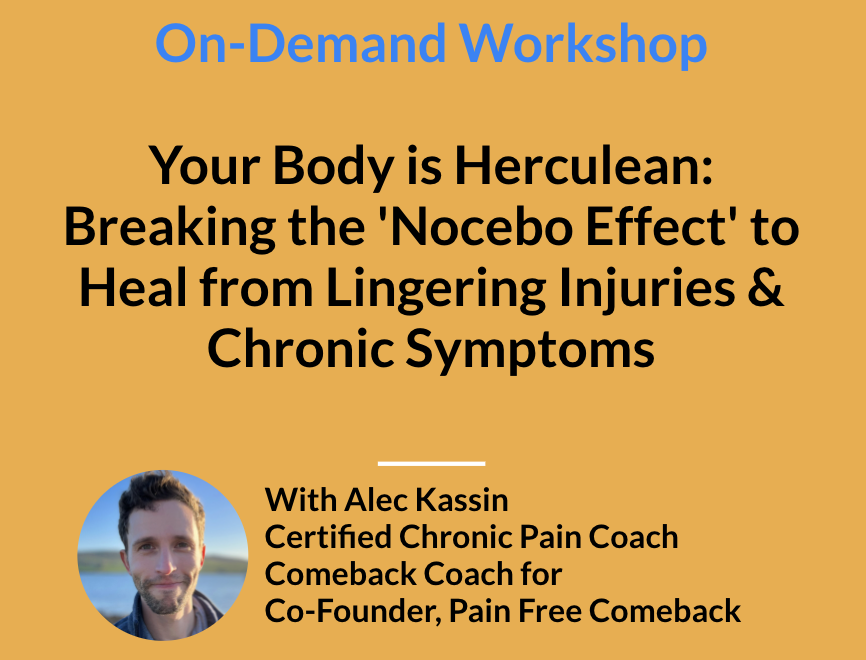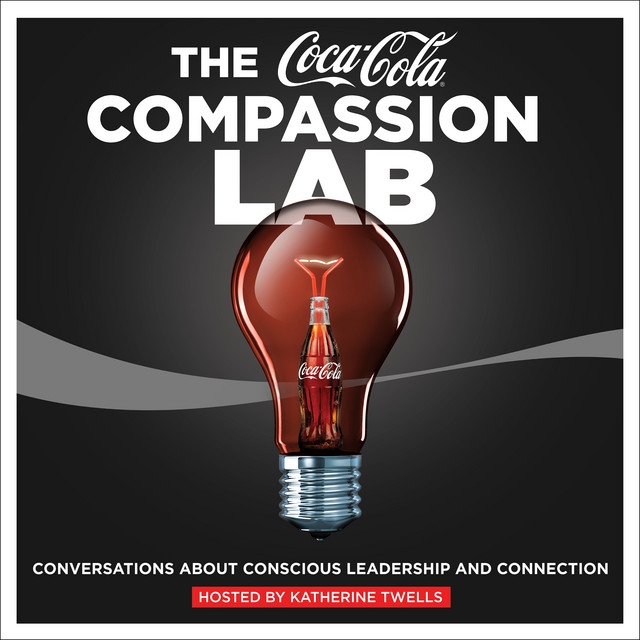HEALING RESOURCES FOR ATHLETES
To help you take back your life and get back to your sport
RESOURCE TYPES
Click the button to be brought to the resource

FREE ON-Demand workshop:
Breaking the Nocebo Effect
Don't know about the nocebo effect? There's a good chance it's a key driver of your symptoms. And just learning about it can bring relief.
In this free and interactive 2-hour workshop you'll learn from a certified chronic pain coach all about how to heal your symptoms and overcome the nocebo effect.
FREE PERSONALIZED RESOURCES:
PAIN FREE
COMEBACK
ASSESSMENT
Our comprehensive assessment will assess your viability for a full recovery, uncover blind spots keeping you stuck, and show you exactly what you need to do to heal. Based on the same questions that the best sports medicine and chronic pain doctors ask their patients in 1:1 settings.
Audio course:
From pain management to pain free
Unlock real, practical tools that can you can implement right away to give you proven long-term relief.
You'll also learn proven pain psychology principles that have helped many athletes and active people make a full recovery from their symptoms.
FREE ACCESS to the first 30 minutes - for a limited time only!
CHANGING YOUR MIND: CHRONIC PAIN & THE BRAIN
Fantastic video directed by Grammy-nominated director Alison Chernick, featuring actor Vince Vaughn and his recovery from chronic back pain.
PAIN SCIENCE PARADIGM SHIFT
Some of the biggest names in the field talk about how people are healing from all sorts of chronic symptoms. Featuring Howard Schubiner, Dr. Becca Kennedy, Alan Gordon, Nicole Sachs, Pain Free Comeback Co-Founder Alec Kassin, and more!
PAIN FREE COMEBACK SUCCESS STORIES
A 4-minute mash-up of real athletes who recovered using the Pain Free Comeback approach.
UNLOCKING THE BRAIN'S ROLE IN CHRONIC PAIN
Watch Pain Free Comeback Co-Founder Alec Kassin's keynote address at the virtual Bone & Joint Summit 2025.


MIRIAM's recovery STORY
Meet Miriam, Co-founder of Pain Free Comeback. She shares her story of overcoming a debilitating shoulder diagnosis and reclaiming her life, regaining her ability to rock climb pain-free.
Alec's recovery STORY
Meet Alec, Co-Founder of Pain Free Comeback. Once a semi-pro cyclist, Alec faced a devastating setback with a ruptured L4-L5 spinal disc at age 18. The diagnosis left him sidelined from college, partially bedridden, dependent on painkillers, and battling depression. Fast forward to 2013, Alec not only became pain free, but realized his body was stronger than he could have ever imagined.

George’s Pain Free Comeback Testimonial
Meet George, a dedicated triathlete who battled two years of relentless pain plaguing his ankles, knees, shoulders, back, and elbows, hindering both his athletic performance and daily life. Once George joined the Pain Free Comeback Program his journey to recovery skyrocketed.
nune's Pain Free Comeback Testimonial
Enduring two years of debilitating groin pain, Nune's world was constrained to mere steps, robbing her of the joys of dance, basic errands, and visits to her loved ones despite exhausting every medical avenue, including a hip replacement. In just three weeks after applying the Pain Free Comeback principles, Nune went from being able to take 30-40 steps without pain, to 13,000.
Click HERE to watch the full interview with Nune!
THE NOCEBO EFFECT & CHRONIC PAIN
In this eye-opening sneak peak from The Pain Free Comeback Program, we delve deep into the fascinating world of the Placebo and Nocebo effects and what it has to do with chronic pain.
CommonNLY TREATABLE Conditions
We've compiled a partial list of commonly brain-generated conditions and symptoms below.
If you see the condition that you're suffering with on this list, there is a very good chance that it can be reversed through a mindbody/ brain-based approach!
If you don't see your condition on this list, please note that this list is not completely comprehensive. Our comprehensive assessment can help you determine whether your lingering injury and symptoms are reversible.
Musculoskeletal Conditions
- Back pain
- Herniated Disc
- Bulging Disc
- Degenerative Disc Disease (DDD)
- Sciatica
- Neck pain
- Shoulder Pain
- Rotator Cuff Tear
- Knee Pain
- Hip Pain
- Labrum Tear
- Chronic Tooth Pain
- Whiplash
- Repetitive Strain Injury (RSI)
- Complex Regional Pain Syndrome (CRPS)
- Reflex Sympathetic Dystrophy (RSD)
- Paresthesias (numbness, tingling, burning sensations)
- Fibromyalgia
- Myofascial Pain Syndrome
- Piriformis Syndrome
- Chronic Tendonitis
- Sciatica Pain Syndrome
- Foot Pain Syndrome
Head / Neurological Conditions
- Migraine Headache
- Tension Headache
- Dizziness
- Trigeminal Neuralgia
- Spasmodic Dysphonia
- Tics
- Benign Tremor
- Non-epileptic seizures (NES) or pseudo-seizures
- Vertigo
- Chronic Fatigue Syndrome
- Long COVID
Heart Conditions
- Reynaud’s Phenomena
- Inappropriate Sinus Tachycardia (heart palpitations)
- Non-cardiac chest pain
Ear, Nose & Throat Conditions
- Tinnitus (ringing in the ear)
- Temporomandibular Disorder (TMD or TMJ)
- Chronic Cough List item one
Digestive Conditions
- Gastroesophageal Reflux Disease (GERD)
- Cyclic Vomiting Syndrome
- Chronic Abdominal Pain Irritable Bowel Syndrome (IBS)
Bladder / Reproductive
- Chronic pelvic pain
- Chronic prostatitis
- Rectal muscle spasm
- Vulvodynia
- Dyspareunia
- Sexual dysfunction
- Interstitial Cystitis (Irritible Bladder Syndrome)
- Frequent Urination
- Gastroesophageal Reflux Disease (GERD)
Skin Conditions
- Chronic eczema
- Hives, Itching
- Hyperhydrosis (excessive sweating)
Mental Health
- Post-Traumatic Stress Disorder (PTSD)
- Anxiety Panic Attacks
- Depression Chronic eczema
Other
- Multiple Chemical Sensitivity
- Hypersensitivty to touch, smell, sound, light, food, medication, etc.
- Insomnia
STUDIES
The below studies represent only a handful of the mountain of research that has come out in support of brain-generated pain and treatments.
Back & Neck
Among asymptomatic individuals (no pain) with an average age of 48:
- 84% showed degeneration in the lumbar spine, including decreased disc signal intensity and disc protrusion
- 79% of these subjects also showed degeneration in their cervical spine.
- 30% of 20-somethings have a bulging disc and are pain free
- 84% of 80-somethings have a bulging disc and are pain free
- 98% had a spinal anomaly, but only 6% had pain from the abnormality. 6% had pain from abnormality + neuroplastic pain.
- 88% had pain that had nothing to do with the abnormality, meaning it was neuroplastic!
Knee
Among Pro NBA players, 50% had lesions on their knees, but are pain free!
Placebo knee surgery outcomes were just as good as actual arthroscopic knee surgery. "The findings, published July 11 in TheNew England Journal of Medicine, call into question the value of a procedure that is performed in roughly 200,000 arthritis patients in the U.S. each year, at a total cost of over a billion dollars."
Shoulder
80% of elite level rock climbers without shoulder symptoms have shoulder abnormalities
Rotator Cuff Tears IN ELITE ATHLETES unassociated with Pain- 40% dominant shoulders had findings consistent with partial- or full-thickness tears of the rotator cuff. None of the athletes interviewed 5 years later had any subjective symptoms or had required any evaluation or treatment for shoulder-related problems during the study period.
Shoulder abnormalities are present in 96% of asymptomatic adults. These include:
- subacromial-subdeltoid bursal thickening (78%)
- acromioclavicular joint osteoarthritis (65%)
- supraspinatus tendinosis (39%)
- subscapularis tendinosis (25%)
- partial-thickness tear of the bursal side of the supraspinatus tendon (22%)
- posterior glenoid labral abnormality (14%) (Girish, 2011)
Elbow
Traditional treatments for Tennis Elbow do no better than Placebos:
Among 36 studies, 11 treatments, 3000 patients for Tennis Elbow… Most patients experienced pain resolution after receiving placebo within 4 weeks of follow-up. At best, all treatments provided only small pain relief while increasing the odds of adverse events.
“At short-term follow-up, only local corticosteroid injection improved pain; however, it was associated with pain worse than placebo at long-term follow-up.”
Fibromyalgia
In 2017, a study involving 200+ Fibromyalgia patients, researchers compared education, cognitive-behavioral therapy (CBT), and a brain-focused emotional awareness and expression therapy (EAET) treatment. EAET showed superior pain reduction, with 17% experiencing over 50% reduction at 8 weeks, rising to 22% at 6 months. This marked the first large-scale demonstration of a psychological intervention surpassing others for chronic pain. EAET gained approval from the US Department of Health and Human Services.
Wrist
Same alternations of carpal tunnel syndrome (impaired median nerve conduction) are seen in 40% of people without pain. - Lucire, 2003, Constructing RSI: Belief and Desire
IBS
In a meta-analysis of IBS studies "the researchers looked at a total of 73 controlled clinical trials comparing the effects of pharmacological treatment versus placebo, for a total of over 8000 patients. Pooling the results of all of these studies, the researchers found a rate of 37% improvement based on placebo alone. This is a much higher placebo effect than for most other conditions and strongly points to a non-physical component.
Whiplash
In Lithuania, 'whiplash' does not exist. There's no association of chronic pain from rear-end collisions. Virtually 0 incidences of whiplash from accident victims.
Whiplash can come from a simulated car crash:
PODCASTS & MEDIA WITH US
We are excited to share our interview on the Mind and Fitness Podcast with Eddy Lindenstein. We dive deep into our journeys of healing, discussing how we overcame debilitating pain, scary diagnoses, and embraced the power of the mindbody connection. From understanding structural abnormalities to rewiring the brain for pain-free living, we offer insights and practical tips for your own healing journey. 💡
In 2024, Alec's Co-Authored book, Leading with Self Awareness became an Amazon Best-Seller. About Alec's Chapter:

On a popular rock climbing podcast, Miriam shares her journey from suffering chronic pain to becoming a pain-free Certified MindBody Practitioner and Trauma-Informed Coach. They delve into how psychological treatments like Pain Reprocessing Therapy (PRT) are changing lives and how personal experiences and emotions play a crucial role in the cycle of pain.

Alec recently had the privilege of being a guest on The Coca-Cola Compassion Lab Podcast — a show dedicated to exploring how we can live more connected, compassionate lives. The host, Kathy Twells, a SVP at Coca-Cola invited him to share his journey and how it can provide hope to the countless people suffering with chronic pain and other symptoms.
What happens when an ultramarathoner and military veteran learns about neuroplastic pain for the first time? You get a raw, honest, and relatable discussion on pain and healing. This is the perfect episode for someone who is newer to the mindbody healing, learning about neuroplastic symptoms for the first time, or doesn't fully believe their symptoms are neuroplastic.

Alec shares an amazing conversation with Kyran O'Neill, former Team England Boxer and Entrepreneur. They discuss how a mindbody approach can help you not only heal lingering injuries and become pain free, but also achieve next-level athletic performance.
On the Pain-Free Athlete Podcast with, Dana Jones, Alec shares his story of battling chronic back pain during college, diagnosed as a ruptured L4-L5 spinal disc. They dive deep into the intricate relationship between physical pain and life's pivotal moments, and discuss the transformative power of addressing emotional issues and nurturing the mind-body connection for healing.💡

Alec joined Einav Avni, award-winning coach and author on her podcast Healing Conversations. Alec shared his journey from enduring debilitating back pain to becoming pain-free, the importance of trusting the process, and committing to internal transformation. They also discuss Pain Free Comeback and how authenticity, hope, and freedom can be your best friends in the midst of challenge and pain.

The TMS Roundtable with Dr. Tovah Goldfine is one of the most well-known forums in the mindbody pain world. Previous guests include Dr. Howard Schubiner and Dr. David Schechter. Alec sat down with 'Doc Tovah' to discuss everything from healing from within by fostering emotional resilience and inner strength, to the importance of feeling safe in therapy, and the balance between doing and being. Give it a listen!
RESOURCES FROM OTHER AMAZING PRACTITIONERS
Audio & Video:
Alec’s Free
Meditations on
Insight Timer
Listen Below!
HELPFUL WEBSITES
Miriam’s Painoutsidethebox Website: Programs and 1:1 coaching available!
Alec’s Website:
1:1 coaching available!
thankyoudrsarno.com: The original pioneering doctor who helped thousands. Read their stories.
SIRPA UK: Amazing organization pioneering the use of mindbody approach to healing from chronic pain in the UK and beyond
Mindbody Medicine: Dr. David Schechter’s website featuring a wealth of information about overcoming chronic pain, scary diagnoses, and other symptoms
Start Your Own Journey!
































